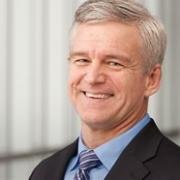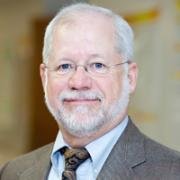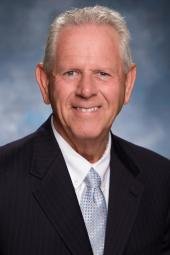Keynote Speaker I -
Russell D. Wolfinger, Ph.D.
Director of Scientific Discovery and Genomics, SAS 
Russ Wolfinger, Ph.D., Director of Scientific Discovery and Genomics at SAS, leads a team in research and development of JMP-based software solutions in the areas of genomics and clinical research. He joined SAS in 1989 after earning a Ph.D. in statistics from North Carolina State University (NCSU). For ten years he devoted his efforts to developing statistical procedures in the areas of linear and nonlinear mixed models, multiple testing and density estimation. In 2000 he started the Scientific Discovery department at SAS.
Wolfinger is a co-author of more than 100 publications and a fellow of both the American Association for the Advancement of Science and the American Statistical Association. He also is an adjunct faculty member at NCSU and the University of North Carolina at Chapel Hill, and a leading member of the MicroArray Quality Control (MAQC) Consortium, which conducts sweeping assessments of genomics technologies and is sponsored by the US Food and Drug Administration.
Keynote Speaker II -
Lawrence J. Lesko, Ph.D., F.C.P.
Professor, Pharmaceutics, University of Florida, Lake Nona, Orlando
Lawrence J. Lesko, Ph.D., F.C.P. joined the UF Research and Academic Center in Lake Nona (Orlando) in July 2011.
Before joining UF, Dr. Lesko worked nearly 20 years in the Food and Drug Administration’s Center for Drug Evaluation and Research as the Director of the Office of Clinical Pharmacology. He was also Chair of the Clinical Pharmacology Coordinating Subcommittee of the FDA’s Medical Policy Coordinating Committee and authored or co-authored numerous Guidance for Industry, and started the FDA’s Voluntary Genomics Data Submission Program and Mechanistic Drug Safety Program.
Lesko has published more than 200 peer-reviewed scientific publications and is a frequent invited national and international speaker in clinical pharmacology, personalized medicine, pharmacometrics and systems pharmacology. His research interests include drug development and regulatory science, quantitative clinical pharmacology and pharmacogenomics.
In 2011, Lesko received the Gary Neil Prize for Innovation in Drug Development from the American Society of Clinical Pharmacology and Therapeutics (ASCPT). He also received the Coriell Scientific Leadership Award for Personalized Medicine (2010), the Rawls-Palmer Progress in Medicine award from ASCPT (2007), the University of North Carolina Institute for Pharmacogenomics and Individualized Therapy Award for Clinical Service (2007), and the Nathanial B. Kwit Distinguished Service Award for Clinical Pharmacology from the American College of Clinical Pharmacology (2007). Lesko served as President of the American College of Clinical Pharmacology in 2004-2006. He is a Fellow in the Japanese Society for the Study of Xenobiotics, American College of Clinical Pharmacology and the American Association of Pharmaceutical Scientists. He is Board Certified in Clinical Pharmacology and a registered pharmacist.
Keynote Speaker III -
No Boundry Thinking Keynote Speaker
Steve Jennings, Ph.D.
 Professor Emeritus of Information Sciences and Bioinformaitcs, UALR
Professor Emeritus of Information Sciences and Bioinformaitcs, UALR
Dr. Jennings is a Professor Emeritus of Information Science and Bioinformatics; he retired from the University of Arkansas at Little Rock (UALR) in 2014 though he still consults on a National Science Foundation Grant concerning “no-boundary thinking” through Arkansas State University. He currently resides in the Tucson area.
Steve received his PhD in Computer Science from Iowa State University in 1981 and his Executive MBA degree from the University of Colorado–Denver in 1991. He started his career in 1980 as an Assistant Professor at Colorado State University and subsequently held numerous senior leadership positions in the software industry developing operating systems and networks, medical device software, web-based financial calculators, mobile communications, artificial intelligence platforms, and high-performance computing systems. He has experience in technical/project/general management, finance and operations, personnel management, marketing and sales, quality improvement, and organizational development. He consulted for several Fortune 500 companies and has been involved with many start-up companies. He has also been active with the management of several not-for-profit organizations.
He returned to academia in 2002 to:
- found the first regional graduate program in bioinformatics in the south-central US (jointly sponsored by UALR and the University of Arkansas for Medical Sciences),
- found the MidSouth Bioinformatics Center at UALR,
- found the MidSouth Computational Biology and Bioinformatics Society (MCBIOS), and
- start up the Bioinformatics Core of the NIH IDeA Network for Biomedical Research Excellence (INBRE) grant to Arkansas.
He was inducted into the Arkansas Academy of Computing in 2013.
Keynote Speaker IV -
William J. (Bill) Welsh, Ph.D.
Norman H. Edelman Endowed Professorship in Bioinformatics, Department of Pharmacology at the Robert Wood Johnson Medical School (RWJMS), Rutgers University in Piscataway, NJ
William J. (Bill) Welsh, Ph.D., holds the Norman H. Edelman Endowed Professorship in Bioinformatics in the Department of Pharmacology at the Robert Wood Johnson Medical School (RWJMS), Rutgers University in Piscataway NJ. Concurrently, he serves as Associate Director of the Division of Cheminformatics of the Biomedical Informatics Center at the Rutgers-Cancer Institute of New Jersey (R-CINJ). He also serves as a research professor in the Department of Chemistry at Princeton University.
Dr. Welsh’s laboratory specializes in the development and application of computational tools for drug discovery and development, cheminformatics, and pattern recognition. Active projects in drug discovery include therapeutic agents for cancer, pain management, and thrombotic conditions. His publication record includes over 500 articles in peer-reviewed books and journals, 200 abstracts for presentations at professional scientific meetings, and multiple patents and patent applications. His research has been funded by the NIH, NSF, EPA, FDA, DoD, the State of New Jersey, and various biotech and pharmaceutical companies. In October 2007, Dr. Welsh founded Snowdon, Inc., (snowdonpharma.com) a biopharmaceutical company that specializes in development and application of computational software to accelerate molecular discovery. He and his family reside in Princeton, New Jersey.
Dr. Welsh received a B.S. degree in Chemistry from St. Joseph’s University (Philadelphia, PA). He earned a Ph.D. in Theoretical Physical Chemistry from the University of Pennsylvania (Philadelphia, PA). He then pursued postdoctoral studies in computational physical chemistry in the Department of Chemistry at the University of Cincinnati (Cincinnati, OH) and at the National Institutes of Health (NIH). Since 2013, Dr. Welsh has collaborated with Dr. Herschel Rabitz in the Department of Chemistry at Princeton University (Princeton, NJ) working on pattern recognition tools for complex high-dimensional multivariate problems in the biomedical arena.
Keynote Speaker V -
Weida Tong, Ph.D.
Director, Division of Bioinformatics and Biostatistics, NCTR/FDA
Dr. Tong is Director of Division of Bioinformatics and Biostatistics at FDA’s National Center for Toxicological Research (NCTR/FDA). He has served science advisory board for several multi-institutional projects in Europe and USA. He also holds an adjunct appointment at several universities. Also, he is the founder and board chairperson of newly established international MAQC Society. His division at FDA is to develop bioinformatic methodologies and standards to support FDA research and regulation and to advance regulatory science and personalized medicine. The most visible projects from his group are (1) conducting the Microarray and Sequencing Quality Control (MAQC/SEQC) consortium to develop standard analysis protocols and quality control metrics for emerging technologies to support regulatory science and precision medicine; (2) development of liver toxicity knowledge base (LTKB) for drug safety; (4) in silico drug repositioning for the enhanced treatment of rare diseases; and (4) development of various tools such as ArrayTrackTM suite to support FDA review and research on pharmacogenomics. Also, his group also specializes in molecular modeling and QSARs with a specific interest in estrogen, androgen, and endocrine disruptor. Dr. Tong has published more than 250 papers and book chapters.


